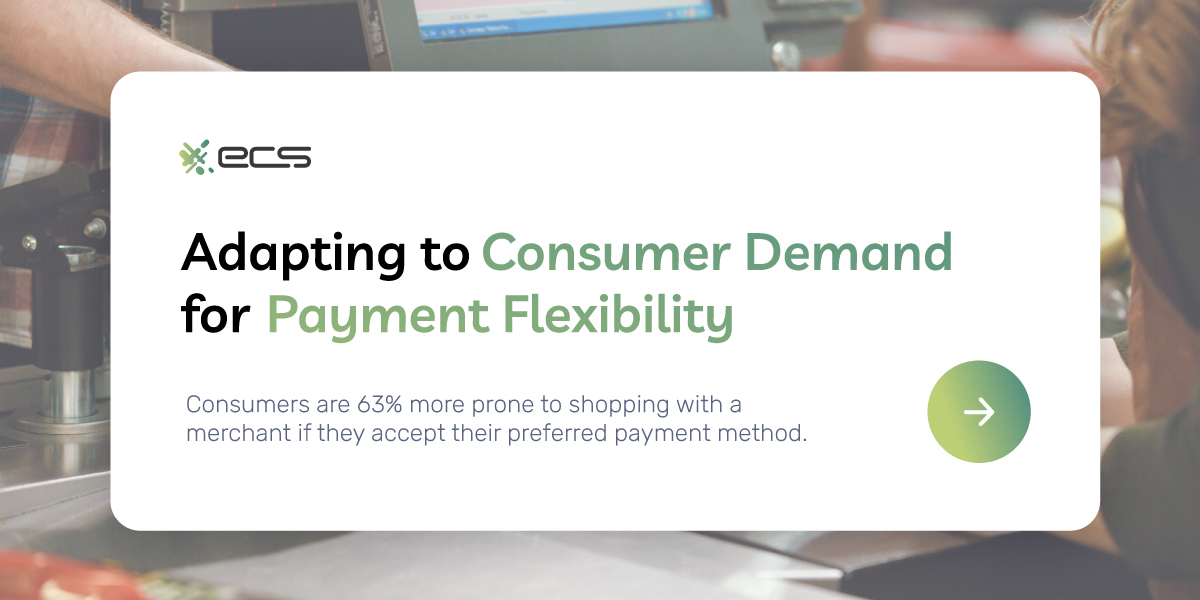“Cash only.” “Card only”. Or, “we accept Apple Pay and Bitcoin!” Which of these do you think will make the most customers happy? You guessed it. Payment flexibility wins every time.
Once upon a time, there was only one way to pay for anything: the coinage of the realm. What that means precisely has varied from place to place. Salt, animal pelts, seashells, precious metals, and (strangely) parmesan cheese have all been used as currency.
Today’s consumers do not need this type of variety, exactly. And you probably don’t want to accept seashells or animal pelts as payment. If you’re reading this article, all of your transactions, at their core, will probably be in US dollars (or possibly currency with the king’s head).However, consumers do want payment flexibility at the point of sale.
Some may want to pay cash, some may want to pay with a debit card, some may want to use credit cards, and some may prefer other methods like e-wallets. In the future, and per the prophecies of Revelations, some may prefer biometric payments.
Credit or Debit Card?
Consumer demand for payment method variety presents a subtle point for consideration vis-a-vis the payment processing fees that business owners pay. The checkout experience is mostly the same for customers, whether they use credit or debit.
This might lead you to think that the charges for plastic payments are all the same. However, there are actually different fees for credit and debit cards. Just as there are credit card networks for facilitating charges (e.g., Visa, Mastercard, Amex, and Discover), there are debit card networks as well, some of which are owned by Visa and Mastercard.
The actual cost of running a debit card is usually lower than that of a credit card. In part, this is because there is less fraud and chargebacks associated with debit card use. PINs are often required with debit card usage, which can cut back on fraud. And as debit card transactions are instantaneously drawing on a customer’s existing account balance, it’s harder for the customer to deny purchases in a chargeback dispute.
What does this all mean for you, the small business owner? Companies like PayPal, Stripe, and Square present themselves as seamless checkout experiences. But at what price? They all charge flat-rate fees for card transactions.
Often, this is something like 2.5% + $0.30. These fees may be slightly above the “average” true cost of running a credit card, but they are often far above the “average” true cost of running a debit card.
You want to honor consumer payment preferences. If customers want to pay with a debit card or a credit card, they should be able to. However, you should not lose money on all the debit card transactions, paying for them as if the customer had offered a credit card. Provide customer satisfaction with a variety of payment methods, but do not short-change yourself.
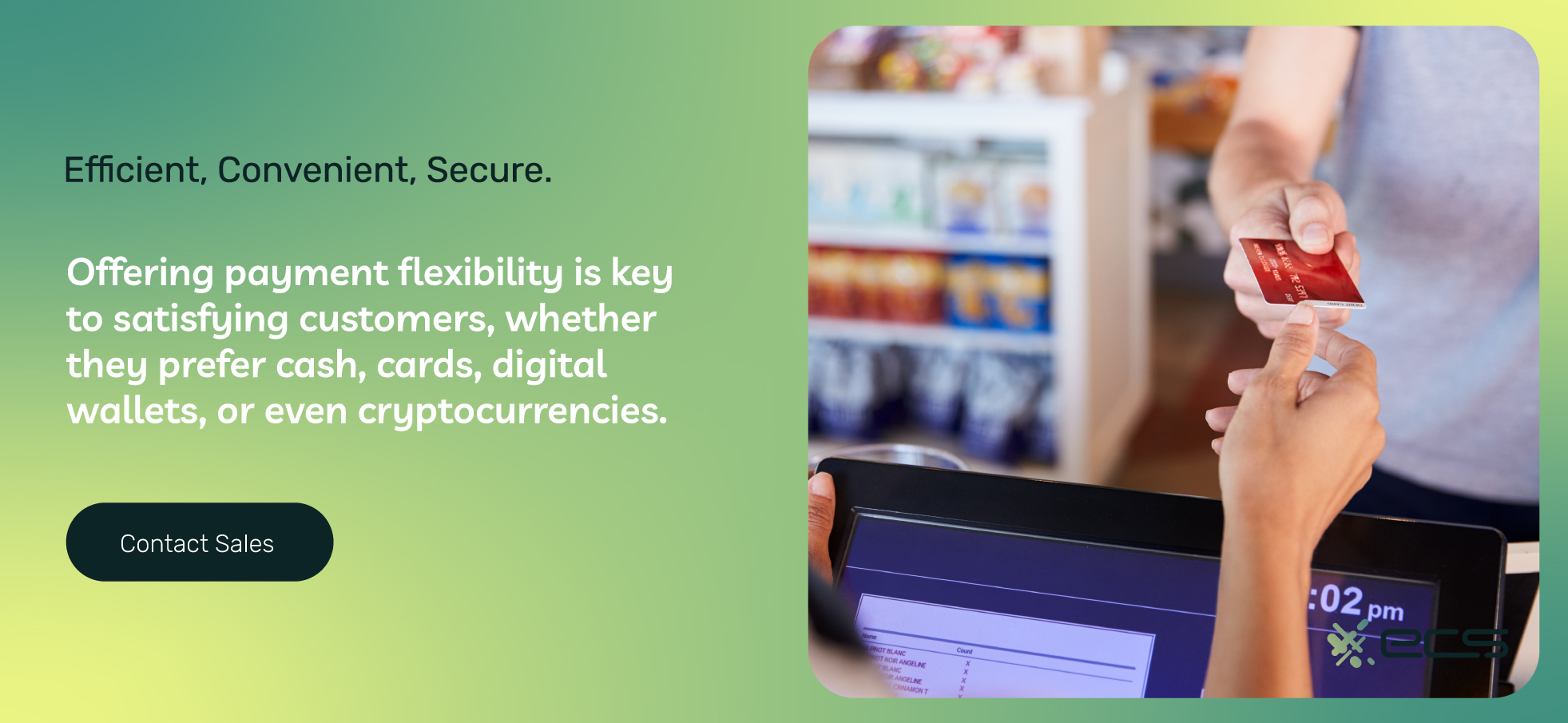
Cryptocurrency Payments
Cryptocurrency payments will be one of the most significant point of sale (POS) innovations over the next 5-10 years. Cryptocurrencies are digital, decentralized “coins” like Bitcoin. Some of these currencies revolve around niche interests and/or are tied in with gaming elements. At this point, cryptocurrencies are largely unregulated, aside from recently legislated attempts by the IRS to catch Americans turning their crypto into USD.
Why should you waste your time accepting currencies that don’t really “exist” in reality and might have bizarre names revolving around obscure interests? Potcoin? Garlicoin? Asscoin? Yes, that last one really is one of them.
Because consumers want it. 50% of consumers believe that crypto is the future of shopping, and not just online shopping: 38% would even use it to buy groceries (in person). “Bitcoin bros” are also losing their gender-based monopoly on crypto, as women continue to narrow the crypto knowledge gap in terms of those who “know a lot” about digital coins (46% to 41%).
The idea of paying for everyday purchases in crypto was once something for comical YouTube viral videos like a man paying for Subway with Bitcoin. Now, over 250 major retailers, including Starbucks, Burger King, and KFC, accept crypto payments. Colonel Sanders was always an innovative fellow.
Offering customers the opportunity to pay for products or services with crypto—especially in brick-and-mortar stores—may seem very far off. However, this technology is already being piloted around the world, with (interestingly) Africa and Asia leading the way.
Recurring Payments and Financial Accessibility
Another aspect of honoring customer preference is providing “buy now, pay later” services. BNPL is a hot e-commerce trend, especially among younger shoppers: 20% of shoppers under the age of 40 use BNPL. Some BNPL shoppers cannot access credit in other ways: 43% of shoppers with credit scores under 620 use BNPL.
Players like Affirm, Afterpay, Klarna, and PayPal Credit dominate the BNPL marketplace. These companies partner with merchants (like Target and Amazon) to give shoppers the option of paying for something over time.
However, online shopping behavior like BNPL is also replicable in stores. POS loans can provide customers with the opportunity to turn a large purchase into manageable chunks. From the business owner’s perspective, yours payment processor’s partnering lender will pay you in full within 24-72 hours. The customer will then owe payments to the lender.
Payment plan options can often circumvent credit-related objections customers may offer (to you or themselves). If they feel they cannot pay for something in one large lump sum, BNPL gives them the flexibility to pay in smaller amounts—for instance, 6, 12, or 18 monthly installments.
Depending on your payment processor, these might be interest-free (which is often another selling point). Instead of the customer paying interest (which is normally how lenders make money), the lender will charge you a fee. Companies like Affirm, Klarna, and Afterpay charge around 6% or higher. More competitive rates may be available from your payment processor and their lender of choice.
Should I Still Take Cash or Check?
Debit cards, credit cards, crypto, and payment plans have all been discussed as part of a successful omnichannel payment strategy. But are cash and checks even worth mentioning? Most consumers carry less than $40 in cash on their person and rarely use it for everyday purchases. As for checks, 46% of Americans didn’t write one at all in 2023.
Let’s touch upon checks first. For many businesses, checks are a hassle to take. They can bounce, need to be cashed, and do not facilitate a quick cash flow (unless you cash them the same day). These are just a few of the reasons why many businesses with a high transaction volume (e.g., grocers, and restaurants) do not take personal checks anymore.
Some businesses will still need to take checks. Checks are often a go-to payment method for large purchases like a car or those that require escrow accounts, like a house. Checks are also used in B2B transactions, especially those with a touch of formality. If your business falls into any of these categories, refusing to accept checks won’t do you good.
What about cash? Around 8% of the country is unbanked, which is surprisingly high. These unbanked individuals do not have (drumroll, please) a bank account, which means debit cards are not an option. And with no bank to make payments from, credit cards are out, too. That leaves cash.
Cash (like checks) can be a hassle to handle. It needs to be deposited. Cash-heavy businesses can also attract crime. It is also easier to become subject to internal theft and unwelcome money laundering. That said, cash may not seem like a suitable payment option, at least regarding payment security.
However, cash is still used exclusively by unbanked customers. Older demographics may also elect to use cash for their purchases. Customers who increasingly identify with cash usage for ideological or political purposes may also become a more significant market segment in the years ahead. If your business serves any of these customers, keep on taking cash, because payment flexibility is key.
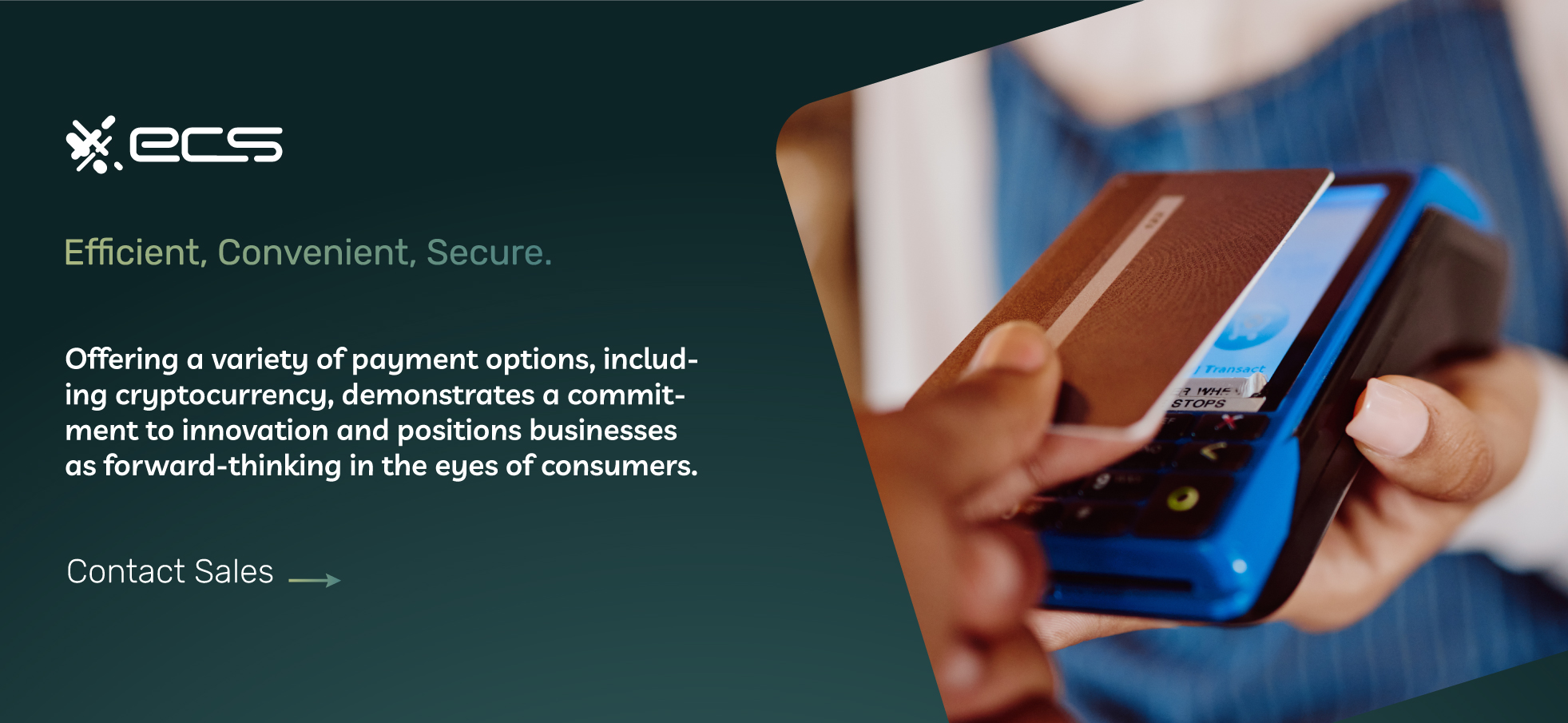
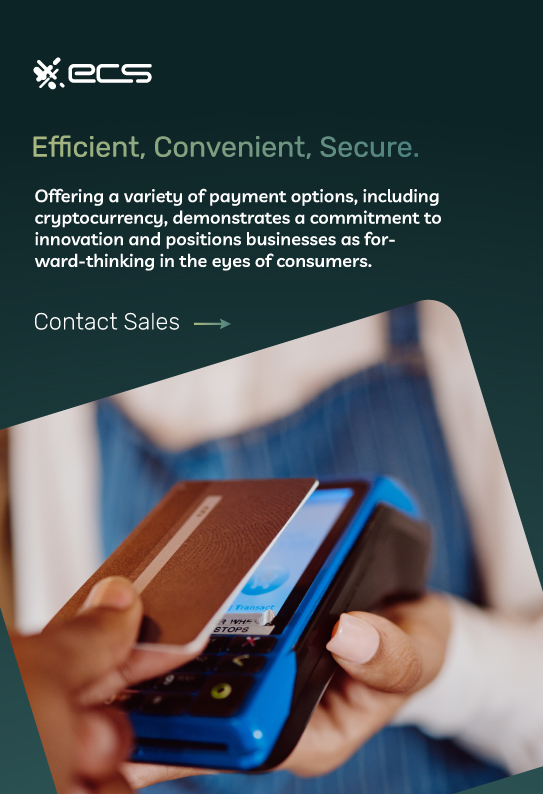
Mobile Payment Solutions and Digital Wallets
Digital wallets like ApplePay store credit card information in-app that the customer unlocks with some biometric verifiers such as a facial scan. The customer can then hover their mobile phone over the POS system to complete a payment. For online purchases, the checkout page will allow the customer to select their digital wallet.
Mobile payments have been at the forefront of contactless payment adoption. During the Covid Pandemic, customers increasingly expressed preferences for contactless payment methods, believing them to be a cleaner and more sanitary way to pay. While plastic debit and credit cards now have contactless NFC technology, so do mobile phones with digital wallets.
In fact, digital wallets are the fastest-growing payment method, with 48% of consumers saying they had used a digital wallet in the past three months, a full 12 percentage points up from the previous year. The average American consumer is already on their smartphone for several hours every day, so blending its usage into the payment landscape can create an impression of seamless checkout experiences.
Digital wallets also offer payment flexibility with its ability to integrate multiple payment options, including customer loyalty and payment gift cards. With the right API integrations, curbside and online retailers can integrate loyalty programs with digital wallet purchases. Loyalty programs are excellent for fostering customer relationships and generating repeat business.
Subscription Payment Models
Subscription payment models can also accommodate the demand for flexibility. This is self-evident if you have a business that demands recurring payments, like a school or program that charges tuition or a landlord that charges rent.
However, you can also funnel customers making a “one-off” purchase into a subscription model, presenting it as a matter of convenience (that also generates steady cash flow for you). Retailers like Target already employ this practice by suggesting that customers “subscribe” to certain repeat purchases (like personal care products).
Your business can do this at the customer checkout as well. This is easier to do online than in person, but it is still possible to offer in both venues. Subscribers can be promised access to better customer support, discounts, and perhaps events.
While you can take card numbers for subscriptions, another option is ACH transfers. ACH bank transfers are set up with checking and routing numbers. They offer much better flat-rate fees than the percentage fees associated with debit and credit cards.
Biometric Payments
So, if we’re talking payment flexibility, does that lead as far as asking if you should offer customers the choice of having their retina scanned or waving their hand over the POS? Well, it’s already being tested out. Mastercard initiated pilot runs of biometric scans in Brazilian convenience stores, and a man in Europe had a microchip implanted in his hand to make in-store payments.
It may strike you as dystopian or utopian, but biometric payments will probably become part of the payment landscape in the next few years. Apple is already using them, essentially to allow consumers to unlock their digital wallets. Just imagine the convenience of still being able to shop even if you left your wallet (or phone) at home.
As the biometric payment market develops, it will be interesting to see how consumers react. Some consumers may find it significantly more invasive than other forms of payment technology, understandably so. All the more reason to continue to let these customers pay with cards, crypto, or cash.
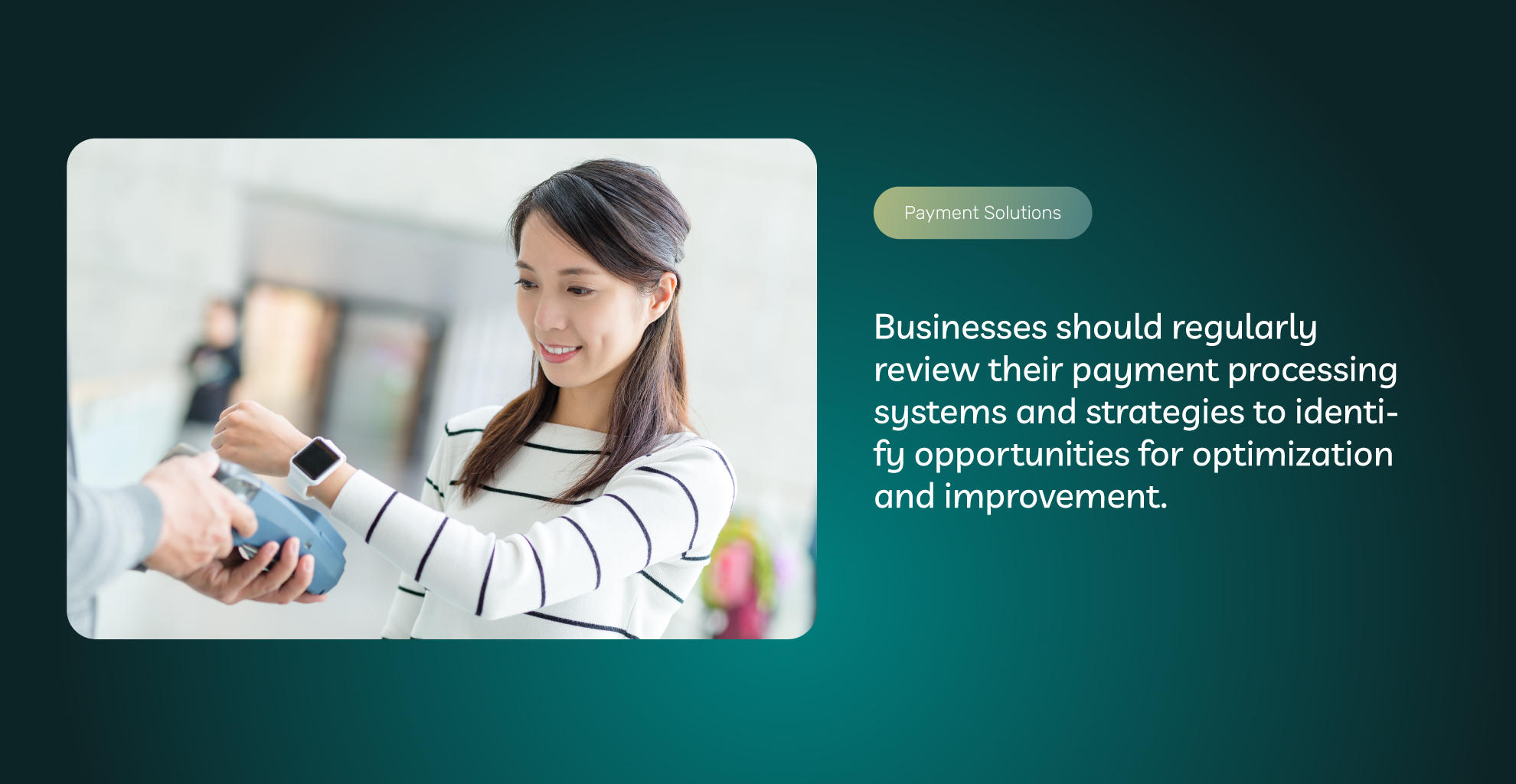
Payment Flexibility and Offering Variety: The Bottom Line
More than ever, we have various ways to accept payments from customers. Each method has its pros and cons. But market research tells us that allowing customers to pay with only one method (e.g., cash only, or card only) is a bad idea.
Consumers are 63% more prone to shopping with a merchant if they accept their preferred payment method. The question is: what is that exactly? For some consumers, it’s a digital wallet. For others, it’s a traditional plastic card. And for an increasing number of consumers, it will be crypto, or perhaps even having their retina scanned.
You can’t teach an old dog new tricks, they say. If you’ve already been in business for a while, it can be daunting to think of accepting a half dozen different ways of making payments. The good news is you don’t have to worry about the particulars of taking any of them (other than cash). Your payment processor can handle all the details.
Contact ECS Payments to learn more about the right payment system integrations for your business by filling out our form or giving us a call.
Frequently Asked Questions About Payment Flexibility For Businesses
Consumers prefer a variety of payment methods. No one method will be selected by everyone, so it is important to provide payment flexibility with a variety of options. These include cash, checks, ACH, debit cards, credit cards, e-wallets, buy now pay later, and even cryptocurrency. If you are considering upgrading to new digital payment solutions, contact ECS Payments for more information.
Credit cards are run on a different network than debit cards. Even though some debit networks are owned by Visa and Mastercard, same as the credit networks, the fees for credit card transactions are higher. This is because credit cards offer more rewards for customers and have greater risks for merchants. Meaning, there is more fraud and chargebacks associated with credit card transactions.
You could definitely consider accepting cryptocurrency payments. Many consumers are now interested in making purchases with cryptocurrency, so having the option provides your consumers with more options and keeps you competitive in your market.
Even though cash and checks are becoming less popular due to the lack of convenience, they still have their benefits for certain customers. Having payment flexibility by accepting as many payment options as possible to satisfy your consumer needs is always recommended.
Mobile and contactless payment methods are becoming increasingly popular. Mobile wallets are convenient, efficient, secure, and more sanitary than cash. If you are considering upgrading to new digital payment solutions, contact ECS payments for more information.
